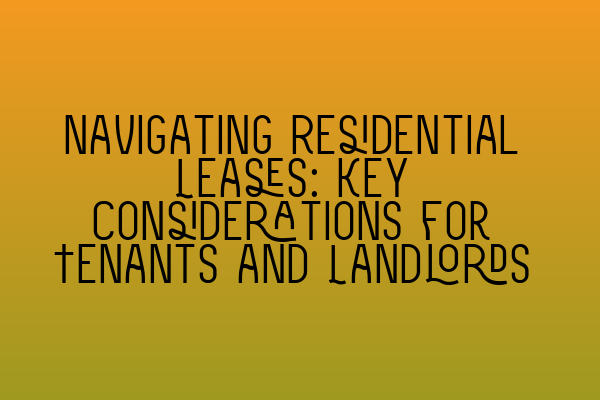Navigating Residential Leases: Key Considerations for Tenants and Landlords
Welcome to the blog of SQE Property Law & Land Law, where we provide expert guidance and insights on various legal matters related to property and land. In this article, we will discuss the key considerations for both tenants and landlords when navigating residential leases. Residential leases are an essential aspect of the property rental market, and understanding the rights and obligations they entail is crucial for both parties involved.
Understanding Residential Leases
Before we delve into the key considerations, let’s start by defining what a residential lease is. A residential lease, also known as a rental agreement or tenancy agreement, is a legally binding contract between a landlord and a tenant. It outlines the terms and conditions under which the tenant occupies the property, including the duration of the lease, rent payment details, maintenance responsibilities, and any additional provisions specific to the property.
Now that we have a basic understanding of residential leases, let’s explore the key considerations for tenants and landlords:
For Tenants:
- Rent and Deposit: One of the primary considerations for tenants is the cost involved. Understanding the rent amount, payment frequency, and any additional fees or charges is essential. It is also crucial to know the amount of the deposit required, the conditions for its return, and whether it will be held in a protected scheme.
- Duration and Renewal: The length of the lease is an important consideration. Tenants should be aware of the initial term and any potential renewal options. Understanding the notice period required to terminate the lease or renew it is crucial when planning for the future.
- Repairs and Maintenance: Clarifying the responsibilities for repairs and maintenance is crucial for both parties. Tenants should thoroughly inspect the property before moving in and document any existing damages. Understanding who is responsible for repairs and how to report maintenance issues will help ensure a smooth tenancy.
- Utilities and Services: Tenants should familiarize themselves with the utilities and services provided with the property, such as water, electricity, and internet connection. Knowing the costs, meter readings, and who is responsible for setting up and paying for these services is important.
- Restrictions and Rules: Residential leases often come with certain restrictions and rules that tenants must abide by. These can include limitations on pets, noise levels, alterations to the property, and subletting. Understanding and complying with these restrictions will prevent any potential disputes with the landlord.
- Termination and Notice Period: Tenants should be aware of the procedures and notice periods required to terminate the lease. Understanding the options available to end the tenancy early, such as a break clause, can be beneficial if circumstances change during the lease term.
For Landlords:
- Screening Tenants: As a landlord, selecting the right tenant is crucial to avoid potential issues in the future. Thoroughly vetting potential tenants by conducting background checks, verifying references, and assessing their financial stability can help ensure a smooth tenancy.
- Rent and Deposit: Determining the appropriate rent amount and deposit is an important consideration. Landlords must adhere to the legal limits for rental deposits and protect them in a government-approved scheme. Clear communication about rent payment methods and any fees or charges should also be part of the lease agreement.
- Repairs and Maintenance: Landlords have a legal obligation to maintain the property in a safe and habitable condition. Understanding the responsibilities for repairs, maintenance, and ensuring necessary safety measures are in place is essential. Clearly outlining these obligations in the lease agreement will help prevent any disputes.
- Tenant Communication: Open and effective communication with tenants is key to a successful landlord-tenant relationship. Providing clear channels of communication, promptly addressing any concerns or repair requests, and ensuring tenants are aware of their obligations under the lease will help maintain a positive rental experience.
- Insurance: Landlords should consider obtaining appropriate insurance coverage for the property, such as landlord insurance or rent guarantee insurance. This can provide financial protection in case of unforeseen events or damage to the property.
- Termination and Renewal: Landlords should be familiar with the legal procedures for terminating a lease and giving notice to tenants. If they wish to renew the lease, understanding the renewal options and requirements is crucial. Adhering to the proper timelines and legal obligations will protect both parties.
By considering these key factors, both tenants and landlords can navigate residential leases with confidence. However, it is important to note that this article provides general guidance and should not be considered a substitute for professional legal advice. If you require specific legal assistance regarding residential leases, consult a qualified solicitor.
For more information on related legal topics, feel free to check out our other articles:
- Misrepresentation in Contracts: Unveiling Deceptive Practices
- A Closer Look at SQE Contract Law Syllabus
- SQE Contract Law: Analyzing Landmark Cases and Influential Judicial Decisions
- Understanding Contractual Capacity: Rights and Limitations
- Interactive SQE Mock Tests for Contract Law: Test Your Knowledge
At SQE Property Law & Land Law, we are here to assist you with your property and land legal needs. Contact us today for expert advice and reliable legal services.
